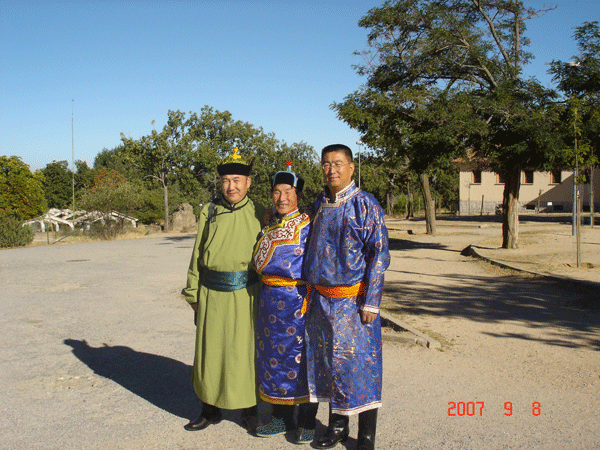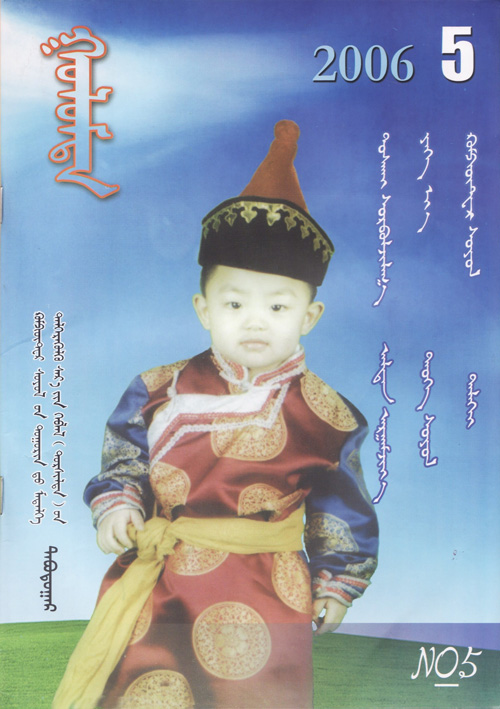| |
|
SMHRIC |
|
April 28, 2008 |
|
New York |
 |
|
Mr. Naranbilig
(left) at the World Gathering of Nomadic and
Transhumant Pastoralists and the World Alliance of
Mobile Indigenous People's First Congress at
Segovia, Spain in September 2007. |
 |
|
Banned
Mongolian journal Golomt edited by Mr. Naranbilig.
All issues are vailable at SMHRIC website:
http://www.smhric.org/uum.htm |
Mr.
Naranbilig, a well-known ethnic Mongolian free-lance journalist
and human rights defender of Southern (Inner) Mongolia, was
arrested on March 23, 2008 at his residence in the region’s
capital Huhhot City. His family members were not given any
official explanation by the Chinese authorities about his arrest
and his whereabouts were unknown until he was released on April
12, 2008 on 20,000 Yuan (approximately 3,000 $US) bail. He was
placed under 1-year house arrest. Police had searched his
residence and seized his personal computer, notebooks and other
personal property. During his detention, he was not allowed to
find a lawyer to defend himself and family members were told not
to reveal the fact of his arrest and to tell others that “he is
on a business trip to somewhere”. In confiscating his passport,
he was warned that he is under the authorities’ tight control
and close monitor.
Mr.
Naranbilig was one of the leaders of the 1981- Mongolian Student
Movement against the Chinese Central Government’s project to
migrate 600,000 ethnic Han into Southern Mongolia. He had
previously served in the Inner Mongolia Autonomous Region’s
Peoples’ Congress after his graduation from Inner Mongolia
University in 1981 but was forced to leave the position a few
years later due to his direct confrontation to Government and
Party leaders and his outspoken criticism of China’s ethnic
policy in the region.
Since then
he started his free-lance journalism career. As one of the most
talented and prolific Mongolian writers in the region, he
authored dozens of books, wrote hundreds of essays and edited
several journals. His writings discussed issues related to
indigenous Mongols’ right to preserve and promote their
language, culture, tradition and identity, the right to access
their lands, water and other traditional resources, the right to
maintain their traditional way of life, and the right to
education and science. Skillful use of logical and
well-organized short narratives with right-to-the-point direct
questioning and merciless pungent irony is his main writing
style.
One of his
recent activities was serving as editor of a Mongolian monthly
journal, “Golomt” (meaning “Family Hearth”. All five issues are
available here:
http://www.smhric.org/uum.htm).
After only 5 issues in 2006, Golomt was banned by the Chinese
authorities due to its unprecedented popularity. As the chief
editor, Naranbilig was questioned and told to not engage in any
such activities as editing. A source who asked not to be
identified revealed to the Southern Mongolian Human Rights
Information Center (SMHRIC) that all 5 issues of Golomt were
translated into Chinese by the authorities for “content review”.
The topics covered in Golomt were freer discussion of indigenous
Mongols’ way out, and promotion of science and education.
Mr.
Naranbilig is also a staunch advocate of indigenous rights of
the Mongols, in particular the herders’ right to access their
traditional grazing land and right to maintain their traditional
way of life. In September 2007, representing the Southern
Mongolian mobile indigenous community, along with members of
SMHRIC, he attended the World Gathering of Nomadic and
Transhumant Pastoralists and the World Alliance of Mobile
Indigenous People’s (WAMIP) First Congress in Segovia, Spain.
Later he joined WAMIP as full-member. His attendance to the
Gathering and membership in WAMIP became grounds for the Chinese
authorities to accuse him of “joining and collaborating with
anti-Chinese hostile foreign organizations”.
This year,
SMHRIC helped Mr. Naranbilig to apply for funding from the
United Nations Voluntary Fund for Indigenous Populations to
attend the Seventh Session of the United Nations Permanent Forum
on Indigenous Issues (UNPFII) that is currently taking place in
New York. The Voluntary Fund accepted his application for
funding but unfortunately, Mr. Naranbilig did not receive the
approval and invitation letters that the Voluntary Fund sent via
both mail and email. All documents sent by the Voluntary Fund to
him were intercepted and confiscated by the Chinese authorities.
These documents were the apparent basis for the authorities’
placing Mr.Naranbilig under house arrest to prevent him from
attending such conferences.
At the
dawn of the Beijing Olympics, the Chinese authorities have
intensified their crackdown on ethnic Mongolians in Southern
Mongolia. Two weeks before Naranbilig’s arrest, another
Mongolian activist, Mr. Tsebegjab, a former professor at the
Inner Mongolia Medical College and a businessman, was arrested
and detained for more than a month before being placed under 1
year house arrest for “liaising” with dissidents in Southern
Mongolia and dissidents in exile in Mongolia. During his
detention, Tsebegjab was harshly interrogated by the authorities
demanding to know if he had any connection with Jiranbayariin
Soyolt, another Southern Mongolian dissident in exile and a
citizen of Mongolia, who was arrested on January 6 at Beijing
Capital International Airport. Mr. Soyolt is still being held by
the Chinese authorities.
Unconfirmed sources state that at least several dozens of ethnic
Mongols have been arrested by the Chinese authorities or have
disappeared recently either due to their differing views on the
ethnic issues of Southern Mongolia or due to their attempts to
protect their legal rights that are guaranteed by both the
Chinese Constitution and the Ethnic Regional Autonomy Law.
|





